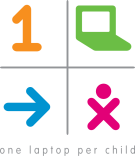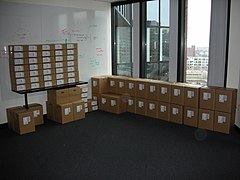واحد ليپ ٽاپ في ٻار
| واحد ليپ ٽاپ في ٻار One Laptop per Child | |
|---|---|
 | |
| تشڪيل | جنوري 2005 |
| نوعيت | Non-profit |
| صدر دفتر | ڪيمبرج, ميساچوسٽس, آمريڪا |
سرڪاري ٻولي |
Multilingual |
Chairman |
Nicholas Negroponte |
اهم شخص |
Rodrigo Arboleda Halaby, سيمور پاپرٽ, ايلن ڪي, مِچ بريڊلي |
| ويب سائٽ | one |
واحد ليپ ٽاپ في ٻار ولفٻ (انگريزي ٻولي: One Laptop per Child 'OLPC'))، هڪ غير-منافعو پَهل آهي جيڪا ترقي پذير دنيا ۾ تعليمي ڊوائيسز جي تياري ۽ ورهائڻ جي مقصد تحت وجود ۾ آندي وئي هئي.
اُن جو بنيادي مقصد OLPC XO جي پيداوار ۽ ورهائڻ هيو،جيڪو هڪ گهٽ-قيمت گهٽ-پاور ليپ ٽاپ ڪمپيوٽر آهي. اصل ۾ اهو منصوبو رُڪن تنظيمن جهڙوڪ اي ايم ڊي، چي ميئي، ايبي، گوگل، مارول ٽيڪنالاجي گروپ، نيوز ڪارپوريشن، نورٽيل، ريڊ هاٽ، ۽ قوانٽا پاران سرمايو ڏنو ويو هيو.
واحد ليپ ٽاپ في ٻار (ولفٻ) منصوبو بي (OLPC project) سندس بنهي مِشن تي تنقيد حاصل ڪئي آهي ۽ اهڙي تنقيد جيڪا اهڙي نظام لاءِ مخصوص آهي جهڙوڪ سهارو، استعمال-جي-آساني، تحفظ (سيڪيورٽي)، مواد-فلٽرنگ اند راضداري جي مسئلن لاءِ مخصوص آهي. ٽئين-دنيا جي ترتيبن ۾ ماڻهن جي ٻين بنيادي ضرورتن جي مقابلي ۾ بعض ملڪن ۾ حڪام جو چوڻ آهي ته قيمت، ثقافتي زور ۽ ترجيح جي لحاظ کان انجي مناسبت هئڻ لاءِ اِن منصوبي تي تنقيد ڪئي آهي.
تاريخ
[سنواريو]هي حصو ترجمو ڪري لکو
At The World Summit on the Information Society held by the United Nations in Tunisia from November 16–18, 2005, several African representatives, most notably Marthe Dansokho (a missionary of United Methodist Church), voiced suspicions towards the motives of the OLPC project and claimed that the project was using an overly "U.S. mindset", pointing out that the presented solutions were not applicable to specifically "African problems". Dansokho said the project demonstrated misplaced priorities, stating that African women would not have enough time to research new crops to grow. She added that clean water and schools were more important. Mohammed Diop specifically criticized the project as an attempt to exploit the governments of poor nations by making them pay for hundreds of millions of machines and the need of further investments into internet infrastructure. Others have similarly criticized laptop deployments in very low income countries, regarding them as cost-ineffective when compared to far simpler measures such as deworming and other expenses on basic child health."
At the 2006 World Economic Forum in Davos, Switzerland, the United Nations Development Program (UNDP) announced it would back the laptop. UNDP released a statement saying they would work with OLPC to deliver "technology and resources to targeted schools in the least developed countries"
لاڳت
[سنواريو]The project originally aimed for a price of 100 US dollars.
منصوبي جي بنيادي طور تي قيمت 100 آمريڪي ڊالرن تائين طئي ڪئي وئي هئي.
استادن جي تربيت ۽ مسلسل حمايت
[سنواريو]The OLPC project has also been criticized for allegedly adopting a "one-shot" deployment approach with little or no technical support or teacher training, and for neglecting pilot programs and formal assessment of outcomes in favor of quick deployment. Some authors attribute this unconventional approach to the OLPC promoters' alleged focus on constructivist education and 'digital utopianism'.
Technology
[سنواريو]- اصل مضمون جي لاءِ ڏسو OLPC XO


An XO-1.75 model is being developed that will use a Marvell ARM processor, targeting a price below $150 and date in 2011.

Software
[سنواريو]Bugs
[سنواريو]Environmental impact
[سنواريو]Anonymity
[سنواريو]Distribution
[سنواريو]
Early distributions
[سنواريو]Give 1 Get 1 program
[سنواريو]
Laptop shipments
[سنواريو]


Regional responses
[سنواريو]South America
[سنواريو]United States
[سنواريو]Republic of Nagorno Karabagh
[سنواريو]Nigeria
[سنواريو]India
[سنواريو]See also
[سنواريو]حوالا
[سنواريو]--!>
